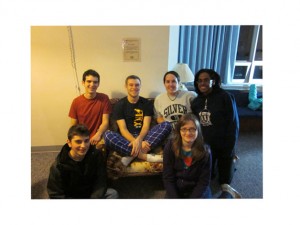
These Treverites are some of the winners of last term’s All-Hall Service Competition. What? You haven’t heard of the Service Competition? It’s a simple contest: be the hall with the most recorded service hours, and win eternal glory and a majestic throne.
This term’s competition got off to a great start with the MLK, Jr. Day of Service. Treverites and Plantzonians alike credited their halls with the hours they volunteered. Speaking of specific halls, last term’s winner was Trever, and they’re looking for a repeat. Plantz is also in the running, but the other halls are lagging behind.
So how can you bring glory to your hall? You could start a hall service council or you could drop by the VCSC in Raymond House to look for volunteer opportunities. Just make sure to credit any service hours to your hall!
By changing the world around you, you too can become volunteering royalty.